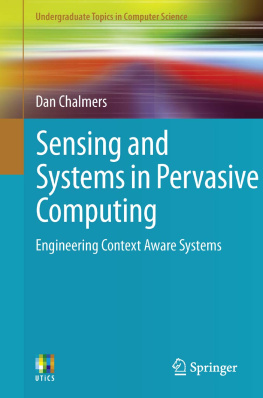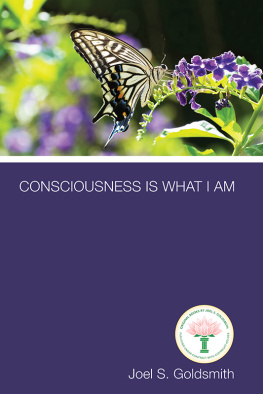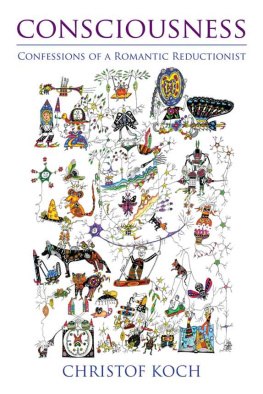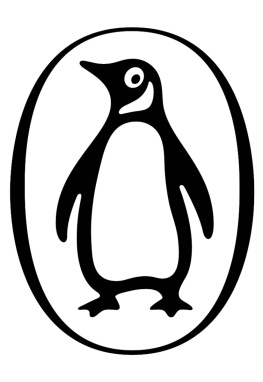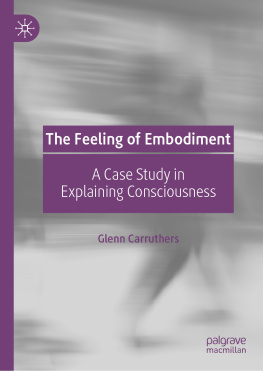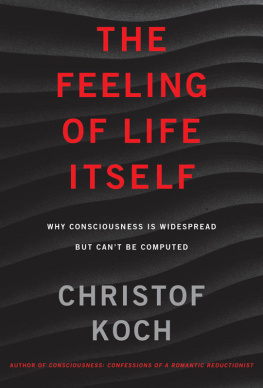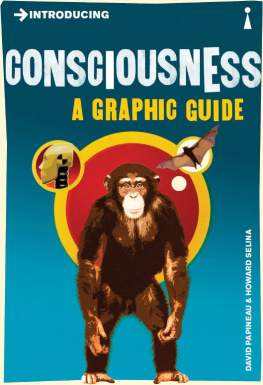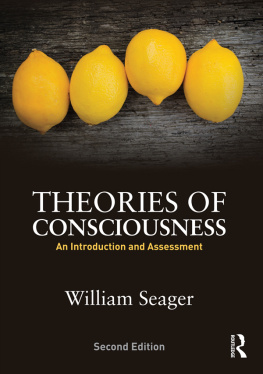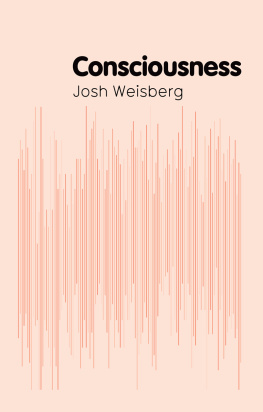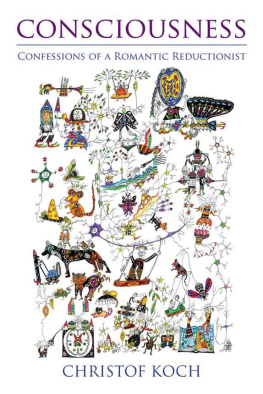THE CHARACTER OF CONSCIOUSNESS
PHILOSOPHY OF MIND
Series Editor: David J. Chalmers, Australian National University
Self Expressions
Owen Flanagan
Deconstructing the Mind
Stephen Stich
The Conscious Mind
David J. Chalmers
Minds and Bodies
Colin McGinn
Whats Within?
Fiona Cowie
The Human Animal
Eric T. Olson
Dreaming Souls
Owen Flanagan
Consciousness and Cognition
Michael Thau
Thinking Without Words
Jos Luis Bermdez
Identifying the Mind
U.T. Place (author), George Graham, Elizabeth
R. Valentine (editors)
Purple Haze
Joseph Levine
Three Faces of Desire
Timothy Schroeder
A Place for Consciousness
Gregg Rosenberg
Ignorance and Imagination
Daniel Stoljar
Simulating Minds
Alvin I. Goldman
Gut Reactions
Jesse J. Prinz
Phenomenal Concepts and Phenomenal
Knowledge
Torin Alter, Sven Walter (editors)
Beyond Reduction
Steven Horst
What Are We?
Eric T. Olson
Supersizing the Mind
Andy Clark
Perception, Hallucination, and Illusion
William Fish
Cognitive Systems and the Extended Mind
Robert D. Rupert
The Character of Consciousness
David J. Chalmers
Perceiving the World
Bence Nanay (editor)
The Senses
Fiona Macpherson (editor)
The Contents of Visual Experience
Susanna Siegel
Attention is Cognitive Unison
Christopher Mole
Consciousness and the Prospects of Physicalism
Derk Pereboom
THE CHARACTER OF
CONSCIOUSNESS
DAVID J. CHALMERS


Oxford University Press, Inc., publishes works that further
Oxford Universitys objective of excellence
in research, scholarship, and education.
Oxford New York
Auckland Cape Town Dar es Salaam Hong Kong Karachi
Kuala Lumpur Madrid Melbourne Mexico City Nairobi
New Delhi Shanghai Taipei Toronto
With offices in
Argentina Austria Brazil Chile Czech Republic France Greece
Guatemala Hungary Italy Japan Poland Portugal Singapore
South Korea Switzerland Thailand Turkey Ukraine Vietnam
Copyright 2010 by Oxford University Press, Inc.
Published by Oxford University Press, Inc.
198 Madison Avenue, New York, New York 10016
www.oup.com
Oxford is a registered trademark of Oxford University Press
All rights reserved. No part of this publication may be reproduced,
stored in a retrieval system, or transmitted, in any form or by any means,
electronic, mechanical, photocopying, recording, or otherwise,
without the prior permission of Oxford University Press.
Library of Congress Cataloging-in-Publication Data
Chalmers, David John, 1966
The character of consciousness / David J. Chalmers.
p. cm. (Philosophy of mind series)
ISBN 978-0-19-531110-5; 978-0-19-531111-2 (pbk.)
1. Consciousness. 1. Title.
B808.9.C48 2009
126dc22 2009038337
1 3 5 7 9 8 6 4 2
Printed in the United States of America
on acid-free paper
ACKNOWLEDGMENTS
I am grateful to far too many people to mention for discussion of the many topics in this book. Some but not all of them are acknowledged below for their help with individual chapters.
The chapters in this book were written over a period of just over a decade at four institutions: Washington University, University of California Santa Cruz, the University of Arizona, and the Australian National University. I am grateful to Andy Clark, David Hoy, Chris Maloney, and Frank Jackson for creating the conditions that made all of these institutions terrific places to work. I am also grateful to the Australian Research Council for a Federation Fellowship, which made much of this work possible.
A number of the chapters of this book were influenced by the extraordinary Summer Institute on Consciousness and Intentionality at UC Santa Cruz in 2002, sponsored by the National Endowment for the Humanities. I am grateful to the NEH, to my codirector, David Hoy, and to the participants in that institute for a remarkable intellectual experience.
I am also grateful to my coauthors, Tim Bayne and Frank Jackson, for their permission to include coauthored material in this book; to Karen Downing and Mire N Mhrdha for their help in preparing the manuscript; to Ole Koksvik and Brian Rabern for proof-reading and preparing the index respectively; to Berit Brogaard, Uriah Kriegel, and Susanna Siegel for their comments on the introduction; and to Robert Miller and Peter Ohlin at Oxford University Press for all their help with the process and for their patience.
As always, I am grateful to my (three) parents for their love and support. This book is dedicated to them.
afterword draws on Moving Forward on the Problem of Consciousness, published in Journal of Consciousness Studies 4 (1997): 346.
is drawn from M. Gazzaniga, ed., The Cognitive Neurosciences III (MIT Press, 2004). It was first presented at a conference at Kings College, London, in 1999 and subsequently at conferences in Amsterdam, Paris, Rio de Janeiro, Taipei, Tokyo, and Zaragoza, and in talks at Arizona, the Central Intelligence Agency, Cornell, CSU Long Beach, Mississippi, Montana, Northwestern, Prague, Queensland, Starlab (Brussels), Victoria, and Virginia. For commentaries in London and Paris, thanks to Scott Sturgeon and Jean Michel Roy. For comments on the written version, thanks to Christof Koch.
is drawn from T. Metzinger, ed., Neural Correlates of Consciousness: Empirical and Conceptual Issues (MIT Press, 2000). It was first presented at the 1998 Association for the Scientific Study of Consciousness (ASSC) conference on Neural Correlates of Consciousness in Bremen, and subsequently in talks at the Australian National University (ANU), Arizona, Delaware, and the Ludwig Maximilian University in Munich. For comments, my thanks go to Stephen Engel, Christof Koch, Thomas Metzinger, and Alva No.
is drawn from S. Hameroff, A. Kaszniak, and A. Scott, eds., Toward a Science of Consciousness II: The Second Tucson Discussions and Debates (MIT Press, 1998). It was first presented at the 1996 Tucson consciousness conference (this chapter is based on a transcript of that talk) and subsequently in talks at ANU, Berkeley, and Stanford.
is drawn from S. Stich and F. Warfield, eds., The Blackwell Guide to the Philosophy of Mind (Blackwell, 2003) and from D. J. Chalmers, ed., Philosophy of Mind: Classical and Contemporary Readings (Oxford University Press, 2002). Thanks to Farid Masrour for comments.
A much-abridged version of appears in B. McLaughlin, A. Beckermann, and S. Walter, eds. The Oxford Handbook of Philosophy of Mind (Oxford University Press, 2009). Some of the material in this chapter is drawn from Materialism and the Metaphysics of Modality (Philosophy and Phenomenological Research 59: 47393, 1999); Does Conceivability Entail Possibility? in T. S. Gendler and J. Hawthorne, eds., Conceivability and Possibility (Oxford University Press, 2002); and Imagination, Indexicality, and Intensions (Philosophy and Phenomenological Research 68: 18290, 2004). Earlier versions of this material were presented as Modal Rationalism and the Mind-body Problem, starting in 1998, at conferences in Arkansas, Buffalo, Kirchberg, Santa Barbara, South Bend, and Sydney, and at colloquia at ANU, NYU, Princeton, Stanford, the University of London, and the University of Nevada, Reno. Thanks go to too many people to mention for discussion and especially to Torin Alter, Ned Block, Tamar Gendler, John Hawthorne, Chris Hill, David Lewis, Brian Loar, Tom Nagel, Susanna Siegel, Daniel Stoljar, and Steve Yablo.
Next page

